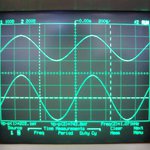First Version
Dependencies: EthernetInterface mbed-rtos mbed
Diff: Codes/SignalProcessor.cpp
- Revision:
- 0:9df41090ba33
diff -r 000000000000 -r 9df41090ba33 Codes/SignalProcessor.cpp
--- /dev/null Thu Jan 01 00:00:00 1970 +0000
+++ b/Codes/SignalProcessor.cpp Tue Jul 21 21:29:49 2015 +0000
@@ -0,0 +1,263 @@
+/*
+ * SignalProcessor.cpp
+ *
+ * Created on:
+ * Author:
+ */
+
+#include <math.h>
+#include <stdlib.h>
+#include <stdio.h>
+#include <string.h>
+
+#include "SignalProcessor.h"
+
+#define SWAP(a,b) tempr=(a);(a)=(b);(b)=tempr
+#define PI 3.14159265358979323846F
+// 3.141597653564793332212487132
+// 3.14159265358979323846
+
+
+/* Elementos vm2, under, over adicionados em 20/05/2014 por Rebonatto */
+/* vm2 eh o calculo do valor medio, under eh a cotagem dos valores do AD com 0 */
+/* over e a contagem do AD com 4095 */
+/* over e under sao para verificar se o processo de ajuste dos dados esta Ok e vm2 para conferir o vm da fft */
+void SignalProcessor::CalculateRMSBulk(float *result, float *vm2, int *under, int *over)
+{
+ int nChannel,nSample;
+
+ for(nChannel=0;nChannel<Settings::get_MaxChannels();nChannel++)
+ result[nChannel] = vm2[nChannel] = under[nChannel] = over[nChannel] = 0;
+
+ for(nChannel=0;nChannel<Settings::get_MaxChannels();nChannel++)
+ {
+ for(nSample=0;nSample<Settings::get_Samples();nSample++)
+ {
+ unsigned short int v = Capture::GetValue(nSample, nChannel);
+ /* novos calculos */
+ vm2[nChannel] += v;
+ if (v <= 20)
+ under[nChannel] = under[nChannel] + 1;
+ if (v >= 4075)
+ over[nChannel] = over[nChannel] + 1;
+ float val = (float)v;
+
+ val -= Settings::get_Offset(nChannel);
+ val /= Settings::get_Gain(nChannel);
+ val *= val;
+ result[nChannel] += val;
+ }
+ result[nChannel] /= (float)Settings::get_Samples();
+ result[nChannel] = sqrt(result[nChannel]);
+
+ /* novos calculos */
+ vm2[nChannel] /= (float)Settings::get_Samples();
+ }
+}
+
+float SignalProcessor::CalculateRMS(unsigned short int *buffer,int nChannel)
+{
+ float result=0;
+ int nSample;
+
+ for(nSample=0;nSample<Settings::get_Samples();nSample++)
+ {
+
+ unsigned short int v = buffer[nSample];
+ float val = (float)v;
+ // cada ponto
+ val -= Settings::get_Offset(nChannel); // diminui o offset
+ val /= Settings::get_Gain(nChannel); // divide pelo ganhp
+ val *= val; // eleva ao quadrado
+ result += val; // soma
+ }
+ result /= (float)Settings::get_Samples(); // divide pelo numero de amostras (256)
+ result = sqrt(result);
+ return result;
+}
+
+void SignalProcessor::CalculateFFT(unsigned short int *buffer,float *sen,float *cos,float *vm,int sign, int ch)
+{
+ //int i;
+ //float value[256];
+ /*
+ printf("Tamanho float %lu\n", sizeof(float));
+ printf("Tamanho double %lu\n", sizeof(double));
+ printf("Tamanho unsigned short int %lu\n", sizeof(unsigned short int));
+ printf("Tamanho unsigned long %lu\n", sizeof(unsigned long));
+ printf("Tamanho unsigned long long %lu\n", sizeof(unsigned long long));
+ */
+
+ /*
+ for(int i=0; i < Settings::get_Samples(); i++)
+ printf("%d*",buffer[i]);
+ printf("\n");
+ */
+
+ //printf("[0] %d %d %d %d\n", buffer[0], buffer[100], buffer[200], buffer[255]);
+ /*
+ for(i=0; i<Settings::get_Samples();i++)
+ value[i]= (float) ( (buffer[i] - Settings::get_Offset(ch)) / Settings::get_Gain(ch) );
+ */
+ printf("Antes ComplexFFT\n");
+ float* fft = ComplexFFT(buffer,1, ch); //deve desalocar memoria do ptr retornado
+ printf("Passou ComplexFFT\n");
+
+ /*
+ Mapa do vetor fft.
+ O vetor tem 2 vezes o no. de amostras. Cada par de valores (portanto n e n+1), representam, respectivamente
+ COS e SEN.
+ Os dois primeiros valores reprensetam a frequencia 0Hz, portanto sao atribuidas ao valor medio.
+ Os demais pares de valores representam a fundamental e suas harmonicas,
+ sendo que se a fundamental for 60Hz, teremos: 60,120,180,240...
+ Para a nossa aplicacao apenas as 12 primeiras harmonicas serao utilizadas (720Hz)
+ */
+
+ //*vm = DFT(value, sen, cos);
+ *vm = fft[0];
+
+ for(int i=1;i<Settings::get_MaxHarmonics()+1;i++)
+ {
+ cos[i-1] = fft[i*2];
+ sen[i-1] = fft[i*2+1];
+ }
+
+ for(int i=0;i<Settings::get_MaxHarmonics();i++)
+ {
+ printf("[%dHz]\tsen %.4f\tcos %.4f\n", (i+1)*60, sen[i], cos[i]);
+ }
+
+ free(fft);
+ //printf("[3] %d %d %d %d\n", buffer[0], buffer[100], buffer[200], buffer[255]);
+}
+
+
+float* SignalProcessor::ComplexFFT(unsigned short int* data, int sign, int ch)
+{
+
+ //variables for the fft
+ unsigned long n,mmax,m,j,istep,i;
+ //double wtemp,wr,wpr,wpi,wi,theta,tempr,tempi;
+ float wtemp,wr,wpr,wpi,wi,theta,tempr,tempi;
+ float *vector;
+ //the complex array is real+complex so the array
+ //as a size n = 2* number of complex samples
+ //real part is the data[index] and
+ //the complex part is the data[index+1]
+
+ //new complex array of size n=2*sample_rate
+ //if(vector==0)
+ //vector=(float*)malloc(2*SAMPLE_RATE*sizeof(float)); era assim, define estava em Capture.h
+
+ printf("Antes malloc\n");
+ vector=(float*)malloc(2*Settings::get_Samples()*sizeof(float));
+ memset(vector,0,2*Settings::get_Samples()*sizeof(float));
+ printf("DEpois malloc\n");
+ //put the real array in a complex array
+ //the complex part is filled with 0's
+ //the remaining vector with no data is filled with 0's
+ //for(n=0; n<SAMPLE_RATE;n++)era assim, define estava em Capture.h
+
+ for(n=0; n<Settings::get_Samples();n++)
+ {
+ if(n<Settings::get_Samples()){
+ //vector[2*n]= (float) ( (data[n] - Settings::get_Offset(ch)) / Settings::get_Gain(ch) );
+ vector[2*n]= (float) data[n] ;
+ // printf("%.4f$", vector[2*n]);
+ }
+ else
+ vector[2*n]=0;
+ vector[2*n+1]=0;
+ }
+
+ //printf("\n");
+
+ //printf("[1] %d %d %d %d\n", data[0], data[100], data[200], data[255]);
+
+ //binary inversion (note that the indexes
+ //start from 0 witch means that the
+ //real part of the complex is on the even-indexes
+ //and the complex part is on the odd-indexes)
+ //n=SAMPLE_RATE << 1; //multiply by 2era assim, define estava em Capture.h
+ n=Settings::get_Samples() << 1; //multiply by 2
+ j=0;
+ for (i=0;i<n/2;i+=2) {
+ if (j > i) {
+ SWAP(vector[j],vector[i]);
+ SWAP(vector[j+1],vector[i+1]);
+ if((j/2)<(n/4)){
+ SWAP(vector[(n-(i+2))],vector[(n-(j+2))]);
+ SWAP(vector[(n-(i+2))+1],vector[(n-(j+2))+1]);
+ }
+ }
+ m=n >> 1;
+ while (m >= 2 && j >= m) {
+ j -= m;
+ m >>= 1;
+ }
+ j += m;
+ }
+ //end of the bit-reversed order algorithm
+
+ //Danielson-Lanzcos routine
+ mmax=2;
+ while (n > mmax) {
+ istep=mmax << 1;
+ theta=sign*(2*PI/mmax);
+ wtemp=sin(0.5*theta);
+ wpr = -2.0*wtemp*wtemp;
+ wpi=sin(theta);
+ wr=1.0;
+ wi=0.0;
+ for (m=1;m<mmax;m+=2) {
+ for (i=m;i<=n;i+=istep) {
+ j=i+mmax;
+ tempr=wr*vector[j-1]-wi*vector[j];
+ tempi=wr*vector[j]+wi*vector[j-1];
+ vector[j-1]=vector[i-1]-tempr;
+ vector[j]=vector[i]-tempi;
+ vector[i-1] += tempr;
+ vector[i] += tempi;
+ }
+ wr=(wtemp=wr)*wpr-wi*wpi+wr;
+ wi=wi*wpr+wtemp*wpi+wi;
+ }
+ mmax=istep;
+ }
+ //end of the algorithm
+
+ /*
+ // Ajustes a FFT
+ for(i = 0; i < Settings::get_Samples()*2; i++ ){
+ vector[i] = (float) ((2 * vector[i]) / Settings::get_Samples() );
+ if (i % 2 == 1)
+ vector[i] = vector[i] * -1;
+
+ }
+ */
+ //printf("[2] %d %d %d %d\n", data[0], data[100], data[200], data[255]);
+
+ return vector;
+}
+
+/*
+float SignalProcessor::DFT(float *data, float *seno, float *coss){
+ int i, j;
+
+ for(i=0; i < Settings::get_MaxHarmonics()+1; i++)
+ seno[i] = coss[i] = 0;
+
+ for(i=0; i < Settings::get_Samples(); i++){
+ for(j = 0; j < Settings::get_MaxHarmonics()+1; j++ ){
+ coss[j] += (data[i] * (cos( (2 * PI * i * j) / Settings::get_Samples() ) ) ) ;
+ seno[j] += (data[i] * (sin( (2 * PI * i * j) / Settings::get_Samples() ) ) ) ;
+ }
+ }
+
+ for(j = 1; j < Settings::get_MaxHarmonics()+1; j++ ){
+ coss[j] = 2 * coss[j] / Settings::get_Samples();
+ seno[j] = 2 * seno[j] / Settings::get_Samples() ;
+ }
+ return (float) (coss[0] / Settings::get_Samples()) + (seno[0] / Settings::get_Samples());
+}
+*/
\ No newline at end of file


